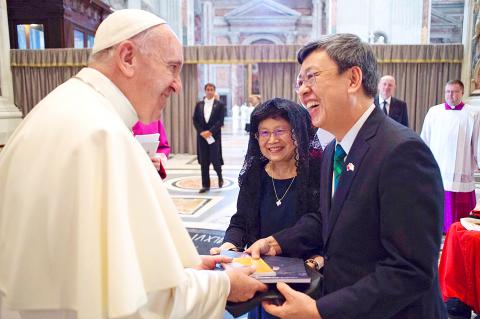Diplomatic relations would not be addressed in an agreement between China and the Holy See that is reportedly ready to be signed before the end of the month to settle a long-standing dispute over the nomination of bishops, a US Jesuit magazine reported on Tuesday.
The question “was not raised in the present negotiations with Beijing, nor was the question of the Holy See’s relations with Taiwan,” reported America, citing sources with knowledge of the matter.
The Holy See is Taiwan’s only diplomatic ally in Europe.

Photo: CNA, courtesy of the Embassy of the Republic of China to the Holy See
Taiwan has lost five allies since President Tsai Ing-wen (蔡英文) took office in May 2016, as China has stepped up its suppression of Taiwan’s international presence in response to Tsai’s cross-strait stance.
Amid media speculation over the content of the agreement, which reports say could lead to the Holy See establishing diplomatic ties with Beijing, the America report cited Vatican sources as saying that the deal would bring together China’s state-backed and unauthorized Catholic communities.
A high-level Vatican delegation is to travel to Beijing for the signing, the magazine said, adding that a date has already been fixed.
“The agreement only deals with the question of the nomination of bishops. It gives each side a say in the selection of candidates, but it recognizes that the pope will have the final word in the appointment of bishops for the Catholic Church throughout mainland China,” the report said.
China and the Holy See consider it “a provisional agreement” to be revisited in a few years, it said.
The Holy See recognizes that it is “not a good agreement,” but believes “it is the only one possible at present and that, in a small, but highly significant way, it opens the door to developing a constructive and improving dialogue with the world’s emerging superpower,” the magazine said.
The report said that the text of the agreement would not be made public, even after it has been signed.
In contrast, a report by the Global Times, a newspaper owned by the Chinese Communist Party’s People’s Daily, on Tuesday quoted the agreement as saying that “future bishops in China should be approved by the Chinese government and mandated by the pope and the letter of appointment would be issued by the pope.”
Citing Francesco Sisci, a senior researcher at the Center of European Studies at China’s Renmin University, the Global Times said that the agreement “would be rather broad on the church in China and should also include provisions for future talks and changes.”
The agreement is the result of negotiations that were revived after Pope Francis took over in March 2013, America said, adding that the administration of US President Donald Trump is not happy with the agreement, a position shared by the US Catholic Church and others.
“They see it as weakening the struggle for religious freedom in China and point to the crackdown on religion in that country in recent months under [Chinese] President Xi Jinping [習近平],” the magazine said.

Taiwan is projected to lose a working-age population of about 6.67 million people in two waves of retirement in the coming years, as the nation confronts accelerating demographic decline and a shortage of younger workers to take their place, the Ministry of the Interior said. Taiwan experienced its largest baby boom between 1958 and 1966, when the population grew by 3.78 million, followed by a second surge of 2.89 million between 1976 and 1982, ministry data showed. In 2023, the first of those baby boom generations — those born in the late 1950s and early 1960s — began to enter retirement, triggering

ECONOMIC BOOST: Should the more than 23 million people eligible for the NT$10,000 handouts spend them the same way as in 2023, GDP could rise 0.5 percent, an official said Universal cash handouts of NT$10,000 (US$330) are to be disbursed late next month at the earliest — including to permanent residents and foreign residents married to Taiwanese — pending legislative approval, the Ministry of Finance said yesterday. The Executive Yuan yesterday approved the Special Act for Strengthening Economic, Social and National Security Resilience in Response to International Circumstances (因應國際情勢強化經濟社會及民生國安韌性特別條例). The NT$550 billion special budget includes NT$236 billion for the cash handouts, plus an additional NT$20 billion set aside as reserve funds, expected to be used to support industries. Handouts might begin one month after the bill is promulgated and would be completed within

The National Development Council (NDC) yesterday unveiled details of new regulations that ease restrictions on foreigners working or living in Taiwan, as part of a bid to attract skilled workers from abroad. The regulations, which could go into effect in the first quarter of next year, stem from amendments to the Act for the Recruitment and Employment of Foreign Professionals (外國專業人才延攬及僱用法) passed by lawmakers on Aug. 29. Students categorized as “overseas compatriots” would be allowed to stay and work in Taiwan in the two years after their graduation without obtaining additional permits, doing away with the evaluation process that is currently required,

IMPORTANT BACKER: China seeks to expel US influence from the Indo-Pacific region and supplant Washington as the global leader, MAC Minister Chiu Chui-cheng said China is preparing for war to seize Taiwan, Mainland Affairs Council (MAC) Minister Chiu Chui-cheng (邱垂正) said in Washington on Friday, warning that Taiwan’s fall would trigger a regional “domino effect” endangering US security. In a speech titled “Maintaining the Peaceful and Stable Status Quo Across the Taiwan Strait is in Line with the Shared Interests of Taiwan and the United States,” Chiu said Taiwan’s strategic importance is “closely tied” to US interests. Geopolitically, Taiwan sits in a “core position” in the first island chain — an arc stretching from Japan, through Taiwan and the Philippines, to Borneo, which is shared by